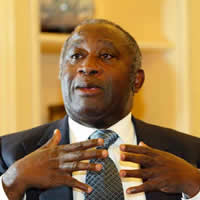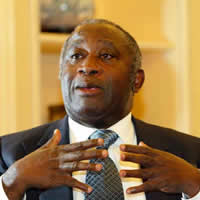The legislation of imperial arrogance

Boubacar Boris Diop Correspondent
The man stares intensely into the camera, an unflinching gaze conveying toughness and resolve. Yet somehow he also looks meek, tame almost, like a cowering wild beast. Although the picture was taken somewhere in the forest, one senses that he still cares deeply about his self-image: the Kalashnikov pointed at the sky, in mock defiance against the powers that be, the air of enormous contentment, the infatuation with his own hubris.
Dozens of children and elderly people were probably being slain at his behest while he was posing thus for the cameras, but the man could not be bothered with such trifles. If he was asked about it, he would have casually replied: “Yes, it’s horrible, but it can’t be helped.”
And maybe he would have added with a wry smile: “War is always messy, my friend”, before mouthing a couple of platitudes about the bright future in store for his beloved nation.
Now, fast-forward: 15 years later, some day in May 2012. We are at the International Criminal Court in The Hague. In the dock, the former warlord is awaiting the verdict to his trial. He still cuts a fine figure in his elegant suit, but gone is the complacency.
Fifty years, with no possibility of parole. Quite simply, this means he is going to spend the rest of his life behind bars. This is Charles Taylor, immortalised. But it could have been Dominic Ongwen, whose trial started last month, or Thomas Lubanga.
It is difficult to see these once powerful men in the dock without feeling a bit sorry for them. It is just human nature; we tend to commiserate with the defeated, however fleetingly or even against our own will.
But for the victims, there is no better proof that justice has been achieved. Their moral victory is encapsulated in those furtive seconds when their torturer elicits an ambivalent compassion, is more terrified than terrifying.
What is on the mind of such men, at the particular moment when, the more they try to remain composed and dignified, the more they strike us as rather overwhelmed, powerless, even clueless?
Maybe they wonder why they must face questions in Europe, of all places, for their past actions and in front of so many foreigners. By entertaining such thoughts, they are, politically speaking, striking at the heart of the matter. It is no coincidence if one after the other, African countries are pulling out of the ICC.
Their main reproach is that it selects its “clients” too tendentiously. In this respect, the current list of politicians already tried, awaiting trial or actively sought speaks volumes about this anti-African bias. Nine out of 10 of the ICC’s current investigations involve African leaders.
It has also entreated the new Libyan government, with exquisite courtesy, to hand over Saif al-Islam Gaddafi. The truth is, in the latter case the ICC is only paying lip service to legal decorum, for it most certainly doesn’t want to hold a trial for Gaddafi’s son.
Too many Western political leaders, active or otherwise, like Nicolas Sarkozy and Tony Blair, are apprehensive of what this articulate and smart young man could tell the judges in a much-publicised trial.
As for Laurent Gbagbo, the Court has never really known what to do with him. At his hearing, he made no bones about his intention to spill the beans and name names, but he was more dangerous in his own country than abroad — especially for Paris.
The case has proven to be anything but a walk in the park for The Hague prosecutors. Gbagbo did contest the results of the 28 November 2010 presidential elections, but this hardly puts him in the same league as Foday Sankoh and Joseph Kony.
What about his victors? Someone must be held accountable, for example, for the hundreds slaughtered in Duékoué — who were all Gbagbo followers.
It would be naive to expect the ICC to push the “fairness” button too hard and level charges against Ouattara, a sitting president, all the more so when the latter is a dear friend of the West.
For a fleeting moment, former warlord Guillaume Soro also popped up on its radar, but since then all rumours of an imminent arrest warrant have faded into oblivion.
Many are rattled to hear anything that incriminates the ICC for its role as a new mechanism of Western hegemony, but the evidence is massive, and the case too grounded in well-documented facts to just toss it aside like a sandcastle.
The Compaoré case, or rather the absence of a case, is one of the ICC’s most notorious “lapses of memory”. As things stand, the snapshots of due legal process from The Hague are mere window dressing. Its trials are politically motivated: behind its dolled-up mask of impartiality.
Quite logically, Namibia, Burundi, Kenya, Gambia, Sudan and South Africa — other African countries will likely follow soon — have decided to withdraw from the ICC, or are seriously contemplating it.
One can only applaud their decision, but not without deploring the fact that perpetrators may thus never be prosecuted, given that African national judicial systems are no credible alternatives to the ICC — not yet.
For instance, without the ICC Charles Taylor would still be enjoying all the perks of a golden political retirement in his Nigerian exile.
But on this particular subject, African leaders have only themselves to blame for having, unlike their Arab and Asian peers, accepted signing and ratifying the Rome Statute instituting this jurisdiction.
It’s true that African states have a far smaller margin of manoeuvre, given that they rely on foreign aid for their bare-bones survival. Understandably enough, they cannot be expected to make brazen claims about national sovereignty and the like.
And yet, the West has gone so far in overtly humiliating African leaders that there is a growing rift between Africa and the Court. Criticism is no longer coming from individual states, but from civil society and the African Union itself.
Architects of international judicial structures were doubtless motivated by the noble desire to protect the weak against the powerful. Yet in spite of substantial gains, the overall performance speaks of failure, not mitigated success.
It is a truism that such international judicial bodies dare not look into the wrongdoings of criminals like George W. Bush.
Hundreds of thousands of Iraqis died, and their country was bombed back into the Stone Age, just because the Bush administration had concocted a fable about Saddam Hussein hiding stockpiles of WMDs somewhere in the desert.
Rather than lose face, Bush and his neo-conservative acolytes infamously went out on a limb to wage a brutal and unjust war of aggression — the evil of evils because, as the Nuremberg judges put it, “it contains within itself the accumulated evil of the whole.”
Why wasn’t George W. Bush tried for this egregious crime? The answer is simple; in the world we live in at present, one must be nuts to even contemplate bringing to justice a former occupant of the White House — and outside the US, to boot.
Why then, was no former Bush administration official prosecuted? Well, technically that’s just not an option on the menu, given that the US still hasn’t ratified the Rome Statute.
What is more, US authorities have gone out of their way to entrap signatory countries in a maze of binding bilateral agreements that override all obligations towards the ICC in cases where US citizens may be involved.
Adding insult to injury, US administrations regularly tout their readiness to collaborate with the ICC . . . on a case-by-case basis.
The subtext here, of course, is that as long as the culprit is not a US citizen or an enemy of the American state, Washington will waste no efforts in lending a hand to make sure the tribunal can score one more hit. A standing joke among DC insiders, no doubt, but when you look into it, there is really nothing funny about such imperial arrogance. — New African.








Comments